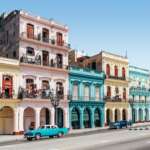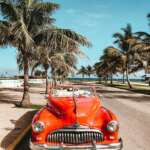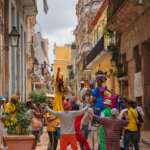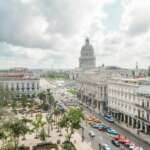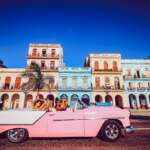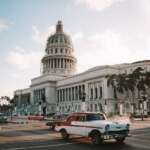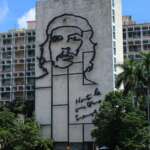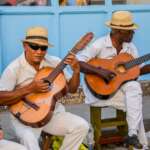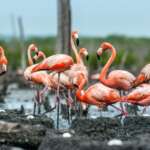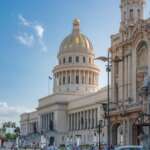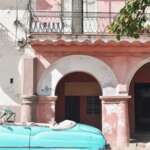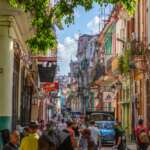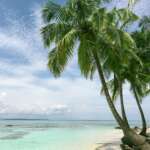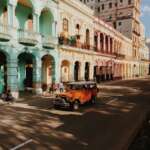A Closer Look at Cuba
Cuba Flag

Cuba Formation Date
January 1, 1959
Cuba Capital Name
Havana
Cuba Neighbours
Exploring Cuba
Cuba: A Vibrant Island Nation with a Rich History and Culture
Cuba, located in the Caribbean Sea, is a country that has captured the imagination of travelers for decades. Known for its vibrant culture, rich history, and beautiful landscapes, Cuba is a must-visit destination for anyone looking for an authentic and unique experience. In this article, we will delve into the various aspects that make Cuba such a fascinating place to visit.Key Takeaways:
- Cuba is an island nation located in the Caribbean Sea.
- The country has a rich history and vibrant culture.
- Cuba's economy is primarily driven by agriculture, tourism, and remittances.
- The country has a unique political system and has faced challenges in its relations with other countries.
- Cuba is known for its stunning natural beauty, vibrant music and art scene, and friendly people.
Geography:
Cuba is the largest island in the Caribbean, spanning over 42,800 square miles. The country is made up of over 4,000 islands and cays, with the main island being divided into 15 provinces. Cuba's geography is diverse, with mountain ranges, fertile valleys, and stunning beaches. The country also boasts natural resources such as nickel, cobalt, and sugar. The climate in Cuba is tropical, with warm temperatures year-round. The country experiences two main seasons: the dry season from November to April and the wet season from May to October. The average temperature in Cuba ranges from 70°F to 80°F, making it an ideal destination for beachgoers and outdoor enthusiasts.Origin and History:
Cuba's history dates back to ancient civilizations such as the Taino and Ciboney people. In the 15th century, the island was colonized by the Spanish, and it remained under Spanish rule until the late 19th century. In 1898, Cuba gained its independence from Spain, but it was later occupied by the United States until 1902. The 20th century saw significant political changes in Cuba, including the Cuban Revolution in 1959, which led to Fidel Castro coming to power. Cuba's relationship with the United States has been tumultuous, with trade embargoes and political tensions. However, in recent years, there have been efforts to improve relations between the two countries.Government and Politics:
Cuba has a unique political system, with a socialist government led by the Communist Party of Cuba. The country is divided into 15 provinces and one special municipality, Isla de la Juventud. The President of Cuba is both the head of state and government, and they are elected by the National Assembly of People's Power. Cuba's foreign relations have been heavily influenced by its political ideology and history. The country has maintained close relationships with other socialist countries such as Russia and China, while also forming alliances with countries in Latin America and Africa.Commerce and Economy:
Cuba's economy is primarily driven by agriculture, tourism, and remittances from Cubans living abroad. The country is known for its production of sugar, tobacco, and coffee. In recent years, there have been efforts to diversify the economy and attract foreign investment. Tourism is a significant source of income for Cuba, with over 4 million visitors each year. The country offers a variety of attractions, including stunning beaches, historic cities, and vibrant culture. However, due to the US trade embargo, Americans face restrictions on traveling to Cuba. The Cuban currency is called the Cuban peso, and the country operates on a dual currency system, with one currency for locals (CUP) and another for tourists (CUC). It is essential to exchange currency before traveling to Cuba, as US dollars are subject to a 10% tax.Demographics:
Cuba has a population of over 11 million people, with a diverse mix of ethnicities. The majority of the population is of Spanish and African descent, with smaller populations of Chinese and Middle Eastern descent. The country has a relatively young population, with over 20% under the age of 15.Culture:
Cuba's culture is a unique blend of Spanish, African, and Caribbean influences. The country is known for its vibrant music and dance scene, with genres such as salsa, rumba, and son originating from Cuba. Art is also an essential aspect of Cuban culture, with many talented artists creating beautiful works inspired by their heritage and surroundings. Cubans also have a strong sense of community and family values. They celebrate many festivals and holidays throughout the year, including Carnival, which showcases colorful parades and lively music.Languages and Religion:
Spanish is the official language of Cuba, but due to its diverse population, there are also regional dialects spoken throughout the country. Religion plays a significant role in Cuban culture, with Catholicism being the dominant religion. However, there is also a significant presence of Santeria, a syncretic religion that combines elements of Catholicism and African religions.Education and Healthcare Systems:
Cuba has a well-developed education system, with high literacy rates and free education for all citizens. The country has several universities and technical schools, producing highly educated professionals in various fields. The healthcare system in Cuba is also highly regarded, with universal healthcare provided to all citizens. The country has made significant strides in public health, with initiatives such as the eradication of polio and the development of vaccines.Sports and Recreation:
Sports play a significant role in Cuban culture, with baseball being the most popular sport. The country has produced many talented baseball players who have gone on to play professionally in the United States. Other popular sports in Cuba include boxing, basketball, and volleyball. Cuba's stunning landscapes and warm climate make it an ideal destination for outdoor activities such as hiking, snorkeling, and diving. The country also has several national parks and nature reserves, providing opportunities for eco-tourism.Tourism:
Cuba offers a variety of attractions for tourists, from its beautiful beaches to its vibrant cities. Havana, the capital city, is a must-visit destination, with its colorful architecture, lively music scene, and historic sites such as the Malecon and Plaza de la Revolucion. Other popular tourist destinations in Cuba include Varadero, known for its stunning beaches and all-inclusive resorts, and Trinidad, a charming colonial town with cobblestone streets and colorful buildings.Travel Information for Foreign Visitors:
Traveling to Cuba requires a visa for most visitors. The type of visa needed depends on the purpose of the trip. It is essential to check with the Cuban Embassy or Consulate in your country for specific requirements. Health and safety should also be taken into consideration when traveling to Cuba. It is recommended to get travel insurance before your trip and to be aware of any potential health risks. As with any foreign country, it is essential to research local customs and etiquette to avoid any cultural misunderstandings. The official currency in Cuba is the Cuban Convertible Peso (CUC), which can be exchanged at banks or exchange offices. US dollars are subject to a 10% tax when exchanging, so it is recommended to bring Euros or Canadian dollars instead.Quotes:
"The Cuban people have an amazingly strong and unbreakable spirit." - Shakira "Cuba has a magic to it that is hard to define." - Wim Wenders "Cuba is like a prince in a poor man's coat: behind the sometimes shabby facades, gold dust lingers." - Eileen BarishConclusion:
Cuba is a country that has captured the hearts of many with its vibrant culture, rich history, and stunning landscapes. Despite its challenges, Cuba continues to thrive and attract visitors from all over the world. As the country continues to evolve and open up to the world, it will undoubtedly remain a top destination for travelers seeking an authentic and unforgettable experience.Cuba Image Gallery
Gallery Caption: Source Unsplash.com
Cuba Highest Point Name
The highest point in Cuba is the Pico Turquino, which stands at 1974 metres (6476 feet) above sea level. It is located in the Sierra Maestra mountain range in Southeast Cuba and is the highest point of the island nation.
Cuba Capital Longitude
Havana, Cuba's capital, is located at longitude 23.13333333 degrees west.
Cuba Capital Latitude
Havana, Cuba is the capital of Cuba. It is located at 23.1333° N, 82.3833° W.
Cuba Official Languages
The official languages of Cuba are Spanish and Lucumí.
Cuba Ethnic Groups
The ethnic makeup of Cuba is a diverse mix of primarily West African and Spanish descent, with a significant contribution of Native American, Chinese, and other influences. The main ethnic group is the Afro-Cuban, comprising approximately 64% of the total population, followed by the mulatto and white population, both accounting for nearly 22%. Additionally, there is a small population of Chinese, indigenous Taíno, and some Europeans, including French, Dutch, and German. Guajiro people of predominantly Spanish and indigenous descent also inhabit rural parts of the country.
Cuba Religions
The predominant religion in Cuba is Roman Catholicism. Approximately 80% of Cubans identify as Roman Catholic. A variety of other faiths are represented in the country, including Protestantism (roughly 10.5%), Santería (roughly 8%), Yoruba traditions (roughly 10%), and elements of the Afro-American spiritualistic tradition of Espiritismo (roughly 6%). Additionally, there is a small Muslim community in Havana with a mosque, as well as a small Jewish community. In the past decades, there has been a rising interest in atheism in Cuba, as well as non-Christian faiths such as Buddhism, Taoism, and Hinduism.
Cuba Total Area
The total area of Cuba is 109,884 sq. km (42,426 sq. mi).
Cuba Land Area
The total land area of Cuba is 110,860 sq km (42,803 sq mi).
Cuba Water Area
Cuba covers an area of 110,860 square kilometers (approx. 42,803 sq mi) and has a total coastline of 3,735 kilometers (2,316 mi). Its Exclusive Economic Zone (EEZ) covers an area of 476,000 square kilometers (approx. 184,312 sq mi), with a territorial sea of 12 nautical miles (22.2 km; 13.8 mi). Cuba has two freshwater sources: surface water (lakes and rivers) and groundwater. The country has approximately 2,664 natural and artificial bodies of water, including 1,921 lagoons, with a total area of approximately 3,326 sq km. Only about 20 rivers are longer than 20 km, and none are navigable for any significant distance. Cuba also has several underground aquifers, which provide the majority of the country’s fresh water supply.
Cuba Total Population
As of July 2020, the total population of Cuba is 11,278,844 people.
Cuba Currency Name
The official currency of Cuba is the Cuban Peso (CUP).
Cuba Currency Code
The currency code for Cuba is CUP.
Cuba Currency Symbol
CUC
Cuba Time Zones
- UTC-05:00
Cuba is located in the Central Time Zone (UTC−05:00), which does not observe daylight saving time. On the first Sunday of April each year, the clocks are shifted by one hour forward, making Cuba an hour ahead of the UTC time. This is done every year on the same day at 2:00a.m., when the clocks are adjusted and local residents gain an extra hour of daylight. This time adjustment is maintained until the last Sunday of October when the clocks are shifted back to the original time at 2:00a.m.
Cuba Calling Code
+53
Cuba Internet TLD
www.aveholidays.cu
How to Say "Cuba" In Different Languages?
- Spanish
- Cuba (es-AR)
- Portuguese
- Cuba (pt-BR)
- Bulgarian
- Куба (bg-BG)
- Chinese
- 古巴 (zh-CN)
- French
- Cuba (fr-FR)
- German
- Kuba (de-DE)
- Greek
- Κούβα (el-GR)
- Indonesian
- Kuba (id-ID)
- Hebrew
- קובה (he-IL)
- Italian
- Cuba (it-IT)
- Japanese
- キューバ (ja-JP)
- Spanish
- Cuba (es-MX)
- Polish
- Kuba (pl-PL)
- Romanian
- Cuba (ro-RO)
- Russian
- Куба (ru-RU)
- Spanish
- Cuba (es-ES)
- Swedish
- Kuba (sv-SE)
- Turkish
- Küba (tr-TR)
- Vietnamese
- Cuba (vi-VN)
Cuba Popular Holidays
- Anniversary of the Cuban Revolution
- 1 January
- Earthquake Day
- 13 January
- Jose Marti's Birthday
- 28 January
- Day of the Torch
- 28 January
- Day of the Cuban Journalists
- 4 February
- World Radio Day
- 13 February
- National Day of the Elderly Person
- 15 February
- National Day of Poetry
- 27 February
- World Wildlife Day
- 3 March
- International Women's Day
- 8 March
- Antimilitarist Day
- 15 March
- International Day of Happiness
- 20 March
- International Day of Forests
- 21 March
- International Day for the Elimination of Racial Discrimination
- 21 March
- World Water Day
- 22 March
- World Weather Day
- 23 March
- International Day for the Right to the Truth Concerning Gross Human Rights Violations and for the Dignity of Victims
- 24 March
- World Tuberculosis Day
- 24 March
- World Autism Awareness Day
- 2 April
- International Day of Solidarity with Cuban People
- 7 April
- World Health Day
- 7 April
- World Health Day
- 7 April
- World Health Day
- 7 April
- March of the Flag
- 16 April
- Anniversary of Bay of Pigs Victory
- 17 April
- Earth Day
- 22 April
- International Workers' Day
- 1 May
- International Day of Families
- 15 May
- International Day Against Homophobia and Transphobia
- 17 May
- Independence Day
- 20 May
- International Day for Biological Diversity
- 22 May
- Flag Day
- 25 May
- International Children’s Day
- 1 June
- World Environment Day
- 5 June
- World Environment Day
- 5 June
- D Day
- 6 June
- World Oceans Day
- 8 June
- World Oceans Day
- 8 June
- International Day of the Tropics
- 29 June
- Bastille Day
- 14 July
- Cuban National Rebellion Day
- 26 July
- Anniversary Day of the Attack on the Moncada Barracks
- 26 July
- National Day of Culture and Friendship Among the Peoples of Cuba
- 27 July
- Santiago de Cuba's Anniversary
- 27 July
- Blue Whale Day
- 29 July
- International Youth Day
- 12 August
- Fidel Castro's Birthday
- 13 August
- World Humanitarian Day
- 19 August
- World Mosquito Day
- 20 August
- Anniversary of the Birth of Our National Hero
- 28 August
- International Vulture Awareness Day
- 5 September
- World Literacy Day
- 8 September
- International Day for the Preservation of the Ozone Layer
- 16 September
- International Day of Peace
- 21 September
- Revolutionary Day
- 22 September
- World Heart Day
- 29 September
- International Day of Older Persons
- 1 October
- International Day of Non-Violence
- 2 October
- World Animal Day
- 4 October
- National Cuban Constitution Day
- 6 October
- Day of Cuban Educators
- 9 October
- World Mental Health Day
- 10 October
- National Day of the Theatre
- 13 October
- International Day of Rural Women
- 15 October
- World Food Day
- 16 October
- Day of Cuban Culture
- 20 October
- Day of Cuban Martyrs
- 20 October
- Harvest Festival
- 2 November
- World Scientists’ Day
- 10 November
- World Diabetes Day
- 14 November
- International Day for the Elimination of Violence Against Women
- 25 November
- World AIDS Day
- 1 December
- World AIDS Day
- 1 December
- World AIDS Day
- 1 December
- Victory Day in Cuba
- 2 December
- International Day of Persons with Disabilities
- 3 December
- International Day of Persons with Disabilities
- 3 December
- World Soil Day
- 5 December
- The Day of the Cuban Revolutionary Armed Forces
- 8 December
- International Anti-Corruption Day
- 9 December
- International Mountain Day
- 11 December
- World AIDS Awareness Day
- 18 December
- International Migrants Day
- 18 December
- Christmas
- 25 December
- Armed Forces Day in Cuba
- 28 December


